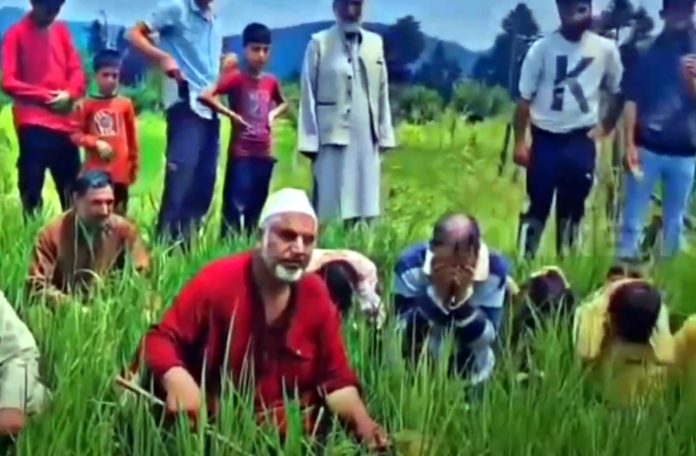Suhail Bhat
Srinagar, July 31: Above-average temperatures is severely affecting crops in the Valley, and experts warn that if rainfall does not occur within the next week, both the quality and quantity of the harvest could suffer, as the crops are at a critical developmental stage and timely precipitation is essential for their growth.
With vegetable and flower petals already showing signs of damage from the intense heat, experts predict a significant drop in crop production. “Temperatures has soared to 36 degrees Celsius, which is 5-7 degrees higher than average, causing harm to vegetables and flowers. Paddy typically thrives at around 32 degrees Celsius with adequate irrigation, but the excessive heat, combined with insufficient water, has stunted growth. This year’s paddy is shorter due to these conditions,” explained Sameera Qayoom, an Agro-meteorologist from SKAUST.
She also warned that fruits like apples are at risk of sunburn from the intense heat, recommending the use of hail nets to protect them from direct sunlight and minimize sunburn and colour changes.
Sumeera highlighted that the Valley has experienced almost no rainfall over the past three months, leading to a critical shortage of irrigation. “We rely on nearly dried-up streams and rivers. The lack of precipitation has resulted in inadequate irrigation, which is detrimental to vegetable crops, causing a decline in quality. Paddy crop also being negatively affected due to unfavorable temperatures,” she added.
To combat such issues in the future, she advised farmers to adopt water harvesting techniques. “Farmers who rely on stream water for irrigation should consider implementing water harvesting strategies. Collecting winter snow or rainwater in pits, whether individually or at the community level, can provide a vital irrigation resource. This proactive approach will help manage similar situations in the future,” she said.
Farmers are increasingly anxious about the impact of climate variability on crops during critical growth stages. “The weather has been harsh for the past three to four seasons, especially during flowering and full development stages,” said Javeed Ahmad, President of the Fruit and Vegetable Market in Pulwama. He acknowledged that, while such climate challenges are natural, they require collective action to respect and conserve nature. “If this trend continues, future crop growth will be severely impacted,” he said.
Director of Agriculture Kashmir, Iqbal Chowdhary, expressed grave concerns about the consequences of a continued drought-like situation. “All crops are affected during this critical developmental period. While paddy crops are currently protected by residual soil moisture, a lack of rain in the coming days will also harm them. Immediate rainfall could help mitigate damage to all crops,” he said.


